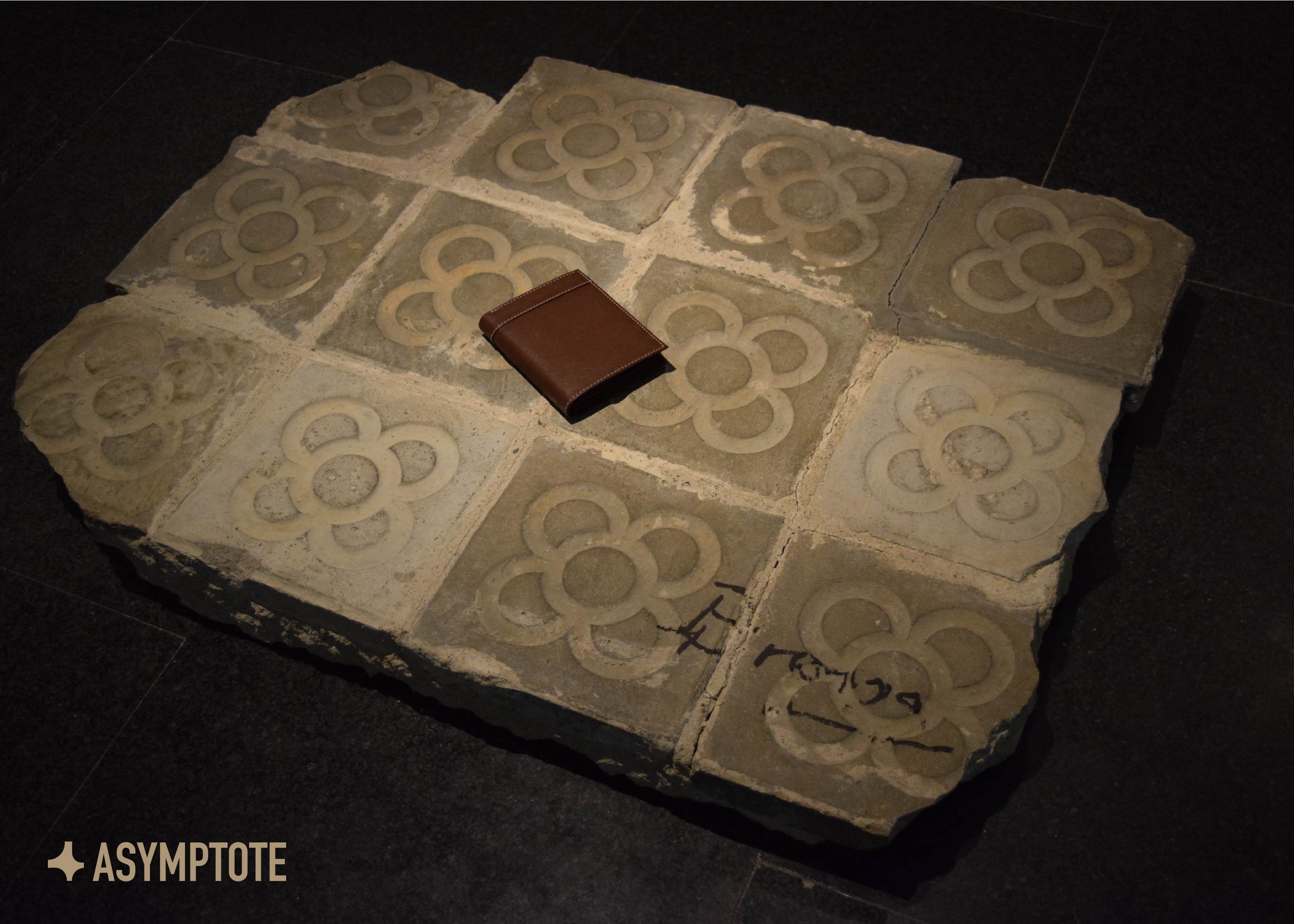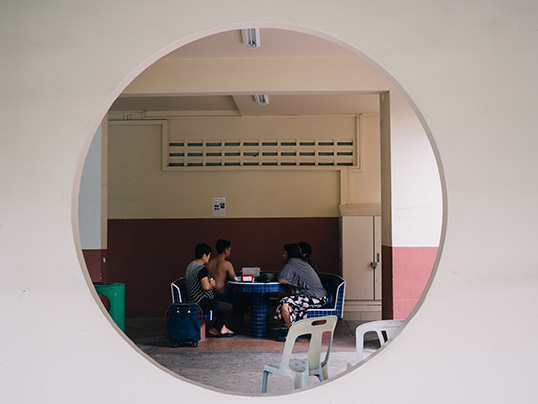On May 25, 1970, Joan Brossa (Barcelona, 1919–1998) spoke out at the first Festival of Catalan Poetry at the Price Theatre, Barcelona, in solidarity with the political prisoners under Franco’s dictatorship. Just a few months ago, in November 2017, the Catalan president controversially announced that in the context of the referendum for independence held in Catalonia, Spain once again had political prisoners. Captured on film by Pere Portabella in a clandestine documentary, fragments of the poems recited by Joan Brossa and other renowned names in Catalan literature are now being shown at the Barcelona Museum of Contemporary Art (MACBA). For an artist, political activist and Catalan nationalist, this intriguing exhibition that offers a new reading of Brossa’s complete works could not be more timely.
Monthly Archives: January 2018
Translation Tuesday: “The Chickens” by Ursula Foskolou
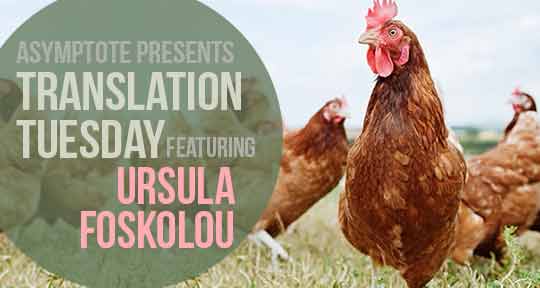
My grandmother's head was cold and in places translucent, like ice that had started to melt.
This piece comes from a published collection of mostly short prose. Many of the stories draw on themes of childhood, memory, unrequited love, and inner conflict, often using strong imagery of hunger and smells. As a translator, what drew me to the stories was the author’s ability to take ordinary and daily experiences and display them in a way that is surreal or fantastical, with a focus on the physicality of our bodies and the objects around us—and to do it all in very short stories (100-150 words each). In this format the subtle differences in syntax and grammar between Greek and English become particularly pronounced. Foskolou often uses longer sentences with one or more dependent clauses, in a way that is not unusual in Greek but would sound awkward or wrong in English. Similarly, the author uses the Greek past imperfect tense to evoke a sense of time and events, and the emotions that surround these events, that is incomplete, deferred, imperfect. English does not have a past imperfect tense, forcing the translator to use other linguistic devices to create a similar effect.
—Pavlos Stavropoulos
Winter 2018: In Conversation with Translator Paul Cunningham
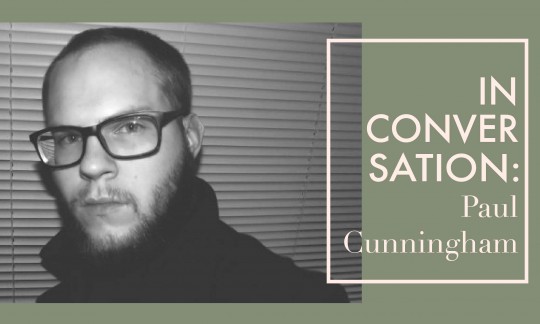
"I don’t want my translations to come across as definitive."
Much of our Winter 2018 issue, from the poetry to the microfiction, shows a strongly surrealist bent; writers like Mohammed Khaïr-Eddine and Nina Iskrenko have an almost limitless capacity to juxtapose discordant words that come off like explosive charges. Against this backdrop, Paul Cunningham’s translations of Helena Österlund appear somewhat sparser, though no less jarring. Ôsterlund’s Words and Colors features a pared-down, repetitive voice, a movement through snowy woods, and a terrifying encounter with a sharp-toothed creature. For me, Words and Colors is reminiscent of Beckett’s How It Is, another work where the contours of individual identity seem to dissolve into a blind, frantic momentum through past, present and future.
Paul Cunningham’s work has been on my radar for some time: not only his translations but also his original writing and video art. In his translations, Cunningham tends to avoid domesticating the poems into a “natural-sounding” English, instead directly transferring the Swedish language’s natural use of compound words. Imagine if we spoke of the German Schadenfreude as “damagejoy” or Poltergeist as “crashghost,” and you might have an idea of the strange effects this can produce in English.
I am always interested in the origin stories of my fellow Scandinavian translators: how they became interested in the languages and their general translation philosophy. I was thrilled to be able to ask Paul a few questions about his previous translations of Sara Tuss Efrik, his video art, and his translation of Österlund’s Words and Colors in the Winter 2018 issue.
David Smith (DS): Your former MFA teacher, Johannes Göransson, has written of your translation approach: “Cunningham is not a Swede or a scholar of Swedish culture . . . he only has rudimentary knowledge of Sweden or Swedish, but uses his artistic instincts and dictionaries . . . His work evidences that rather than demanding some kind of scholarly mastery, sometimes translation demands fascination, interest, and a willingness to be vulnerable, to get it done without having legitimized status as Master.” This is beautifully put and intriguing on multiple levels. But I thought I’d start just by asking you to fill in your story a little. What was it that brought you to learn Swedish, specifically? And what was the “fascination and interest” that led you to literary translation?
In Review: The Restless by Gerty Dambury
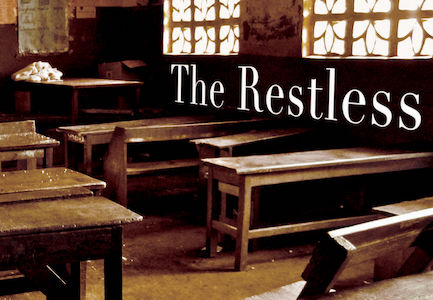
Those who speak out against oppression, especially women, form the foundation of a better future.
The Restless by Gerty Dambury (The Feminist Press, 2018). Translated by Judith G. Miller
Gerty Dambury’s The Restless, translated from the French by Judith G. Miller, takes place in her native Guadeloupe, a Caribbean island that has been an overseas department of France since just after the second World War. Guadeloupeans of different ages, genders, and social statuses narrate the events surrounding the violent confrontation between the construction workers’ union and the French prefecture that took place on May 26th, 1967. On this day, as workers gathered outside the building where the union negotiated wage raises with business owners, the French prefect ordered troops to fire on the crowd, and the situation degenerated from there. The lynchpin of the novel is a little girl, Émilienne, who’s waiting for her father to come home so he can explain to her why her teacher has disappeared. While she waits in the courtyard of her home, a chorus of her family members and neighbors (both living and dead) contextualize the two absences and how they relate to the broader experiences of the island.
Though Émilienne acts as the focalizer, the chief narrators are her eight brothers and sisters, who speak with a more-or-less undifferentiated voice. They proclaim themselves the “callers” of the story, which they structure after the Caribbean quadrille, a sort of creolized version of a French square-dance. The caller of the quadrille is conventionally singular and male, but Émilienne’s siblings are happy to innovate. They often hand over the reins to guest narrators, who act as temporary callers. Each section of the narrative has a primary caller, though others often chime in, and corresponds to one of the four quadrille figures in rhythm and mood. Émilienne’s siblings helpfully guide the unfamiliar reader’s expectations of the musical conventions at the beginning of each figure/chapter. The multivocality and musicality of the text, two of its most distinguishing features, could have posed a challenge to Miller’s translation. The differences between the figures and the characters’ voices are discussed more than demonstrated.
Blog Editors’ Highlights: Winter 2018

Our blog editors pick their favorite pieces from the Winter 2018 issue!
To celebrate our seventh birthday here at Asymptote, the blog editors have chosen some of our favorite pieces from the Winter 2018 issue to showcase. This issue truly shines with a diversity of voices and literary styles, including a special feature on micro fiction, and it was such a pleasure for us to read through it. With work from thirty different countries, this issue has been gathered under the theme of “A Different Light.” Enjoy these highlights!
I’ve always admired Asymptote‘s advocacy for literatures that not only are underrepresented, but that take chances, resist easy reduction or interpretation by the reader. Poems that dare to be “the awkward spectacle of the untried move, not grace” (to borrow a phrase from American poet Don Byrd). Poets like Mohammed Khaïr-Eddine. The poems from Arachnid Sun shock me with their bold imagery, impelling me to read again and again. I latch on to certain repeated images: insect, illusion, blood. And definitely a noticeable theme of authoritarian rulers: “spider-eggs perfuming the silence the dictator” and “harpoon the king-shark who flees the riverbeds of polar scrubland.”
Weekly Dispatches from the Frontlines of World Literature

Bringing this week's greatest hits from the four corners of the literary globe!
Our weekly news update continues in the dawn of this exciting and unpredictable year, but before we get down to business, Asymptote has some very important news of its own (in case you missed it): our new Winter 2018 issue has launched and is buzzing with extraordinary writing across every literary genre! Meanwhile, our ever-committed Editors-at-Large—this week from Brazil, Hungary and Singapore—have selected the most important events, publications and prizes from their regions, all right here at your disposal.
Theophilus Kwek, Editor-at-Large, reporting from Singapore:
2017 ended on a high note as Singapore’s literary community celebrated the successes—and homecomings—of four fiction writers who have gained international acclaim: Krishna Udayasankar, Rachel Heng, JY Yang, and Sharlene Teo. At a packed reading organized by local literary non-profit Sing Lit Station on December 30th, the four read excerpts from their recent or forthcoming work, from Yang’s Singlish-laced speculative short fiction, to fragments of Teo’s novel Ponti, winner of the inaugural Deborah Rogers Writer’s Award. The following weekend, Udayasankar and Heng joined other Singapore-based writers such as Toh Hsien Min and Elaine Chiew for two panel discussions on aspects of international publishing, which aimed to promote legal and ethical awareness among the community here.
Other celebrations in the first fortnight of 2018 took on more deep-seated local issues. Writers, musicians and artists from among Singapore’s migrant community presented a truly cosmopolitan evening of song and poetry to a 400-strong audience that included fellow migrant workers, migrant rights activists, and members of the Singaporean public. Among the performers were the three winners of 2017’s Migrant Workers’ Poetry Competition, alongside Rubel Arnab, founder of the Migrants’ Library, and Shivaji Das, a prominent translator and community organizer. Several days after, indie print magazine Mynah—the first of its kind dedicated to long-form, investigative nonfiction—launched their second issue with a hard-hitting panel on ‘History and Storytelling’. Contributors Kirsten Han, Faris Joraimi and Yu-Mei Balasingamchow all spoke persuasively about contesting Singapore’s official narratives of progress and stability, and the role of writers in that truth-seeking work.
Announcing the Winter 2018 Issue of Asymptote

Celebrate our 7th anniversary with this new issue, gathering never-before-published work from 30 countries!
We interrupt our regular programming to announce the launch of Asymptote‘s Winter 2018 issue! Here’s a tour of some of the outstanding new work from 30 different countries, which we’ve gathered under the theme of “A Different Light”:
In “Aeschylus, the Lost,” Albania’s Ismail Kadare imagines a “murky light” filtering through oiled window paper in the ancient workroom of the father of Greek tragedy. A conversation with acclaimed translator Daniel Mendelsohn reveals the “Homeric funneling” behind his latest memoir. Polish author Marta Zelwan headlines our Microfiction Special Feature, where meaning gleams through the veil of allegory. Light glows ever brighter in poet Mohammed Khaïr-Eddine’s “syntactically frenetic” “Arachnid Sun”; and in Erika Kobayashi’s fiction, nuclear devastation blazes from Hiroshima to Fukushima.
The light around us is sometimes blinding, sometimes dim, “like a dream glimpsed through a glass that’s too thick,” as Argentine writer Roberto Arlt puts it, channeling Paul to the Corinthians in The Manufacturer of Ghosts. Something dreamlike indeed shines in César Moro’s Equestrian Turtle, where “the dawn emerges from your lips,” and, as if in echo, Mexican writer Hubert Matiúwàa prophecies for his people’s children “a house made of dawn.” With Matiúwàa’s Mè’phàà and our first works from Amharic and Montenegrin, we’ve now published translations from exactly 100 languages!
We hope you enjoy reading this milestone issue as much as everyone at Asymptote enjoyed putting it together. If you want to see us carry on for years to come, consider becoming a masthead member or a sustaining member today. Spread the word far and wide!
*****
Read More News:
An Inventory of Resistance: Notes on Catalan Language Politics in Literature
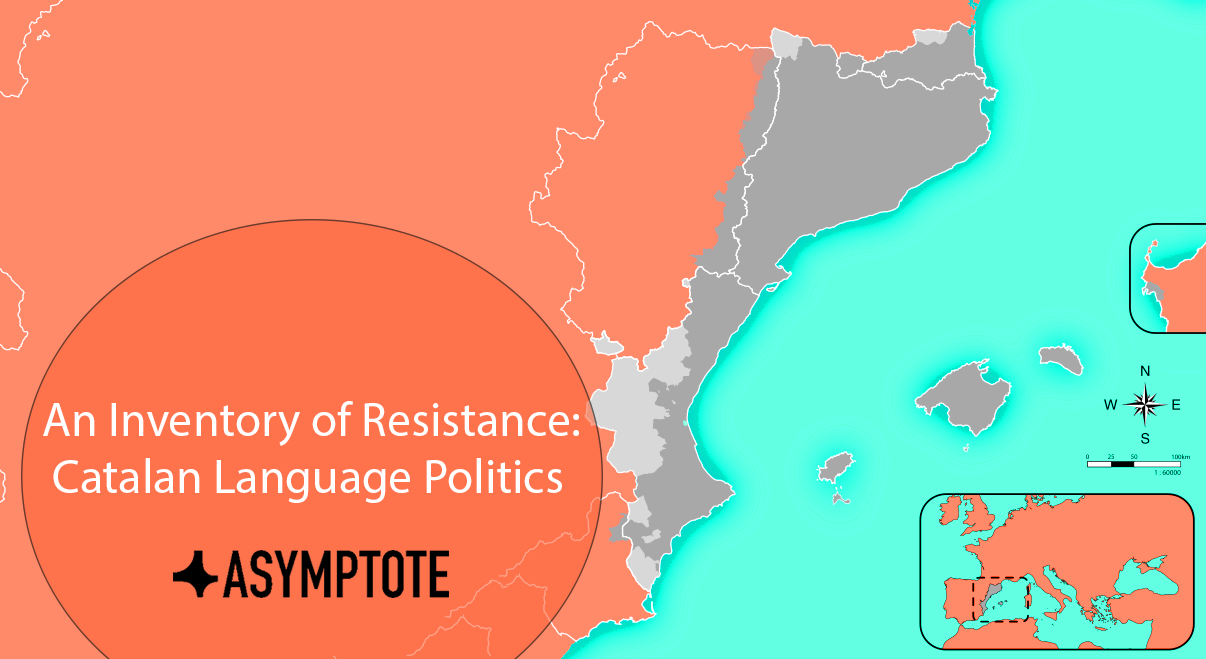
Perhaps part of the uniqueness of Catalan comes from this awareness of its influence on and disconnection from Castilian and European traditions.
Part I: The Nineteenth Century
At first, I was hesitant to write an article on the uses of the Catalan language in literature throughout recent history. After the referendum for Catalan independence held this past October 1, which was deemed illegal by the Spanish government, and the subsequent episodes of violence that occurred in the region, the topic has come to be a sensitive matter for any national. However, where there is a language, there is a literature, and the history of Catalan is one of stubborn resistance. It is my contention that the history of a language is somehow lived out in those who speak it, insofar as a sentiment of ambiguity still informs contemporary critical debates on the usefulness and adaptability of Catalan literature. “Is Catalan literature diverse enough? Can it cultivate all genres? Is it economically viable?” are questions that have resonated among critics and the public alike. Catalan literature inherits a sense of shame from its own fruition, and it is this feeling that I want to explore with this genealogy of usages.
This is not a history of Catalan literature and the texts featured here have not been selected according to an aesthetic canon. This is an archive of perceptions of Catalan language and literature as experienced throughout the nineteenth and twentieth centuries, from the literary resurgence known as La Renaixença in Catalan literary history (parallel to which political Catalan nationalism as we know it unfolds) to the relatively normalized literary field in existence today. While certainly not the only appropriate approach, in what follows I present a succession of events from the nineteenth century that Catalan historiography has employed to explain the evolution of the uses of the language.
Translation Tuesday: “I’m Scared of Those Dots” by Mirka Szychowiak
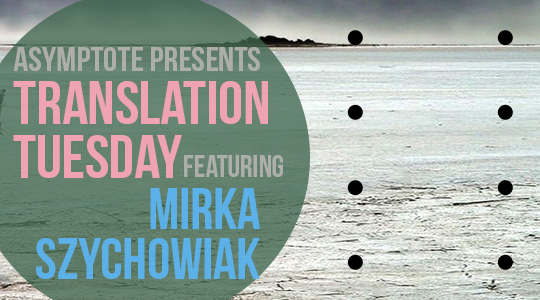
Somebody said that the healthiest ones die most easily.
Today’s Translation Tuesday comes from the Polish writer Mirka Szychowiak. “I’m Scared of Those Dots” is a haunting ellipsis of a story, concealing just as much as it reveals.
I came earlier today, let’s spend as much time together as we can, let’s enjoy each other’s company, stock up on it. As usual, we won’t be able to answer the same questions, but they will be asked nonetheless.
Zbyszek, who pushed you out of that dirty train? Your bloody blonde mop on the tracks, it still hurts. Who did it to us? How are you, Basia, do tell. What’s up? You were the fastest among us, made us so proud. Somebody said that the healthiest ones die most easily. You didn’t want to be an exception, did you? You passed away at a faster pace than when you broke the 100-metre record. Rysiu, your last letter made us angry. You better all come, you wrote. Your life with us was filled with laughter, but you were alone when you shot yourself for some strange girl. We were furious, but almost all of us did come. Almost, because Bolek had left by then, as was his custom, quietly. He fell over and that was it. Two hours after his death, he became a father. Both prematurely. Youth gave us no guarantees, we understood it early on and only Adam didn’t get it in time—it was the youth, which tore his heart apart, like a bullet. It was so literal it stripped him of all romanticism. It poured out of him, ripped him inside and that was it. Later it was Bożenka and Janusz. The two of them and the carbon monoxide from the stove. A potted fern—a nameday present—withered and then somebody called to say that there were less of us yet again.
In Conversation: Daniella Gitlin on translating Rodolfo Walsh’s Operation Massacre
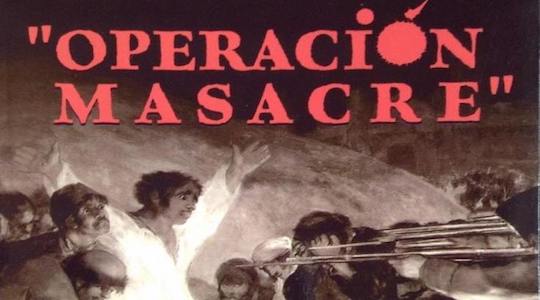
"Walsh is relevant for American readers now, even if they don’t necessarily understand the nitty-gritty of the political situation of his time."
One challenge of translation is finding a text that appeals to an audience separated geographically and culturally from the author. Finding a nonfiction text with that kind of currency is all the more difficult. The translator of nonfiction is faced with a text tied to local events and often steeped in a historical, social, and political context. Why should the average international reader care about nonfiction in translation? Today, Asymptote sits down with Daniella Gitlin, the translator of the famous 1957 Argentinian reported novel, Rodolfo Walsh’s Operación Masacre (Operation Massacre), previously excerpted in our Summer 2013 issue, to discuss her encounters with a masterpiece of nonfiction and outline the urgent relevance of a text six decades old.
Lara Norgaard (LN): Tell me a bit about how you came to translate Operation Massacre.
Daniella Gitlin (DG): I spent the year after college in Buenos Aires working for a nonprofit, Poder Ciudadano, with a Princeton in Latin America Fellowship. I was back in Argentina for a visit and told my friends there that I was applying for the nonfiction writing program at Columbia. Before I left, my friend Dante gave me a copy of Operación Masacre with a dedication in it. He wrote, “Dani my dear, a little ‘Argentinian nonfiction’ will do you good. I hope you like it.” I took the book back with me. I had heard of Walsh, but I didn’t really know anything about him.

